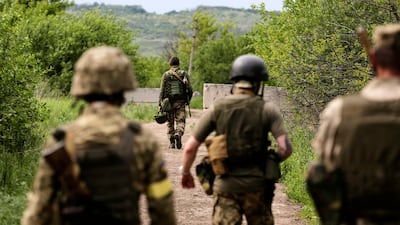Ukrainian troops have launched a counter-offensive in a bid to regain control of the southern port of Kherson, the first major city captured by Russia in the early days of the invasion.
This counterattack comes as Moscow's troops entered the disputed city of Severodonetsk, in the eastern Donbas region.
Ukrainian forces began their push against Moscow’s hold on Kherson, which Russia had considered to be securely under its remit, amid news of destruction in Severodonetsk, where the governor said nine tenths of the town was destroyed.
Russian President Vladimir Putin’s military rolled into Kherson — which sits on the Black Sea and Dnieper river, north of annexed Crimea — during the first week of the war.
A senior pro-Russian official in the region has said its formal bid to become part of the Russian Federation was likely to be launched “towards next year”.
Kirill Stremousov, deputy head of the Russian-backed Kherson Military-Civilian Administration, suggested a referendum could be held on the matter, after initially ruling out a public vote.
Moscow has introduced the rouble in Kherson, and on Monday Russian news agency Tass said grain exports had begun.
“We have space to store [the new crop] although we have a lot of grain here. People are now partially taking it out, having agreed with those who buy it from the Russian side,” Mr Stremousov said.
Mr Stremousov also said the administration was working on providing supplies of sunflower seeds to local and Russian processing plants.
Ukraine has accused Russia of stealing its grain from the territories Moscow has occupied since the invasion in February.
As Ukrainian soldiers converge on Kherson, Russia’s war effort is being seriously hampered by “devastating losses” of its mid and junior officer ranks, Britain said.
In an intelligence update on Monday, the UK’s Ministry of Defence said the loss of a large number of the younger generation of professional officers will likely exacerbate Russian Army problems in modernising its command-and-control structure.
The MoD also said that Russian battalion tactical groups being rebuilt with survivors from other units are likely to be less effective on the battlefield due to a lack of junior leaders.
“Russia has likely suffered devastating losses amongst its mid and junior ranking officers in the conflict,” the MoD said.
“Brigade and battalion commanders likely deploy forwards into harm’s way because they are held to an uncompromising level of responsibility for their units’ performance.
“Similarly, junior officers have had to lead the lowest level tactical actions, as the army lacks the cadre of highly trained and empowered non-commissioned officers who fulfil that role in Western forces.”
A chronic lack of credible platoon and company commanders “is likely to result to a further decrease in morale and continued poor discipline” among Russian troops, the MoD said.
Meanwhile, Ukrainian President Volodymyr Zelenskyy made a five-hour journey to the eastern city of Kharkiv on Sunday, his farthest venture out of the capital since Russia invaded on February 24.
His sought to assert the strength of Ukraine’s position in the region during his rare frontline visit.
Defending forces pushed Russian troops back from positions near the city, Ukraine’s second-largest, several weeks ago.
“I feel boundless pride in our defenders. Every day, risking their lives, they fight for Ukraine’s freedom,” Mr Zelenskyy wrote on the Telegram messaging app after visiting soldiers stationed in Kharkiv.
He said he had dismissed the regional head of the country’s security agency, the SBU, for his poor performance.
“He did not work to defend the city from the first days of the full-scale war but thought only of himself personally. What were his motives? Police are investigating,” Mr Zelenskyy said.










































